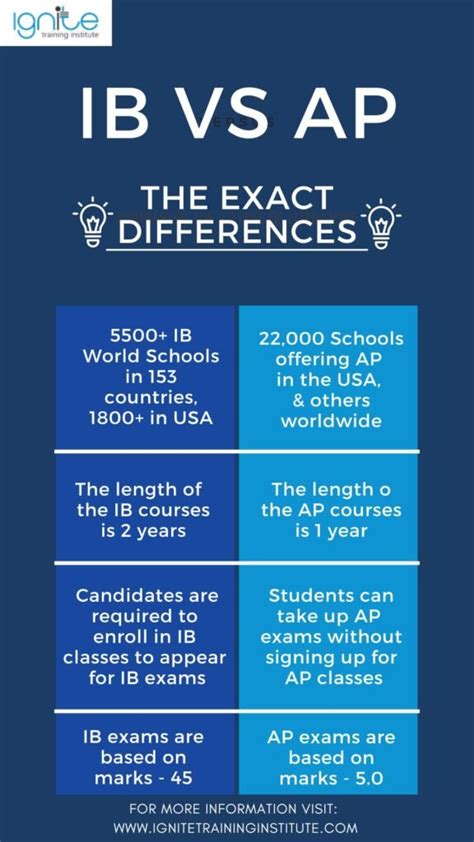For high school students pursuing a rigorous and challenging academic path, International Baccalaureate (IB) and Advanced Placement (AP) programs offer compelling options. Both programs cater to highly motivated individuals seeking to delve into advanced coursework and prepare for college-level studies. However, they differ in their approaches, curricula, and assessment methods.

Key Differences
1. Curriculum and Assessment:
- IB: The IB Diploma Program focuses on a broad and holistic education, encompassing six subject groups: Studies in Language and Literature, Language Acquisition, Individuals and Societies, Sciences, Mathematics, and the Arts. Students choose six subjects, including three at Higher Level and three at Standard Level. The IB curriculum is standardized globally and culminates in external exams administered and graded by IB examiners.
- AP: AP courses are designed to provide college-level instruction in specific subject areas, allowing students to explore advanced topics in depth. Students can choose from over 30 AP subjects, ranging from Calculus BC to World History. AP exams are scored on a 1-5 scale, with a score of 3 or higher typically considered passing for college credit.
2. Scope and Rigor:
- IB: The IB Diploma Program is a two-year program that requires students to study a broad range of subjects and engage in independent research and inquiry. The curriculum emphasizes developing critical thinking, problem-solving, and research skills.
- AP: AP courses are typically one-year courses that allow students to focus on a specific subject area. The curriculum is designed to be rigorous and academically challenging, preparing students for college-level coursework.
3. College Credit and Recognition:
- IB: IB Diploma Program graduates are eligible for college credit and advanced placement at universities worldwide. The IB diploma is recognized by over 3,000 colleges and universities in the United States and abroad.
- AP: AP exams can earn students college credit or advanced placement at many colleges and universities in the United States. Over 90% of U.S. colleges and universities accept AP credits.
Similarities
1. Advanced Coursework:
- Both IB and AP programs offer advanced coursework that provides students with opportunities to explore topics beyond the standard high school curriculum.
- They encourage students to develop critical thinking, analytical, and problem-solving skills that are essential for success in higher education.
2. Preparation for College:
- IB: The IB Diploma Program is designed to prepare students for the rigors of college-level work and research.
- AP: AP courses provide students with a simulated college-level learning experience and help them develop the knowledge and skills necessary for success in college.
3. Student Development:
- Both IB and AP programs emphasize developing students’ intellectual, personal, and social skills.
- They encourage student engagement, independent learning, and a global perspective.
Which Program is Right for You?
The best program choice for a student depends on their individual needs, strengths, and goals.
Consider the IB Diploma Program if:
- You are seeking a broad and rigorous education that prepares you for college and beyond.
- You are interested in pursuing a range of subjects and developing a global perspective.
- You enjoy independent study and research.
Consider AP courses if:
- You are interested in delving deeply into specific subject areas and pursuing college-level coursework.
- You want to earn college credit before entering college.
- You prefer a more focused and structured academic experience.
Pros and Cons: A Comparison
IB Diploma Program:
Pros:
- Provides a broad and holistic education.
- Qualifies students for college credit and advanced placement worldwide.
- Develops critical thinking, problem-solving, and research skills.
- Encourages student engagement and independence.
Cons:
- Can be demanding with a heavy workload.
- Requires significant time investment, including outside of class.
- May not provide as much flexibility and choice as AP courses.
AP Courses:
Pros:
- Provides college-level instruction in specific subject areas.
- Allows students to earn college credit and advanced placement.
- Develops critical thinking and problem-solving skills.
- Offers more flexibility and choice compared to the IB Diploma Program.
Cons:
- Can be less rigorous than the IB Diploma Program.
- May limit students’ exposure to a wider range of subjects.
- Can involve significant outside-of-class workload and preparation.
Impact on College Applications
Both IB and AP programs can enhance college applications and demonstrate a student’s academic rigor and commitment.
IB:
- The IB Diploma Program is highly respected by colleges and universities worldwide.
- Earning an IB diploma can demonstrate a student’s ability to succeed in a rigorous and challenging academic environment.
- Students who score well on IB exams may qualify for college credit and advanced placement, reducing their college workload.
AP:
- AP courses allow students to earn college credit and advanced placement.
- AP scores can boost a student’s weighted GPA and make them more competitive in college admissions.
- Earning high AP scores can demonstrate a student’s ability to succeed in college-level coursework.
Statistics and Trends
IB Diploma Program:
- In 2021, over 176,000 students from 159 countries earned the IB Diploma.
- Over 3,000 colleges and universities worldwide recognize the IB diploma for college credit and advanced placement.
AP Courses:
- In 2021, over 2.8 million students took AP exams in the United States.
- Over 90% of U.S. colleges and universities accept AP credits for college credit or advanced placement.
Conclusion:
IB Classes and AP courses provide students with valuable opportunities to pursue advanced coursework, develop critical thinking skills, and prepare for college. Choosing the right program depends on individual needs, strengths, and goals. By carefully considering the differences and similarities between the two programs, students can make an informed decision that aligns with their academic ambitions.
